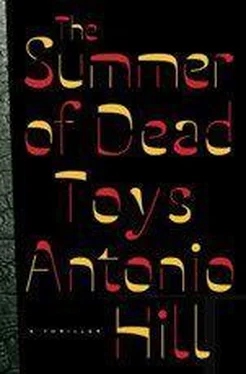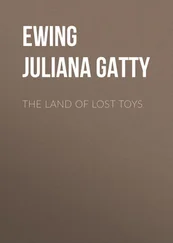Antonio Hill - The Summer of Dead Toys
Здесь есть возможность читать онлайн «Antonio Hill - The Summer of Dead Toys» весь текст электронной книги совершенно бесплатно (целиком полную версию без сокращений). В некоторых случаях можно слушать аудио, скачать через торрент в формате fb2 и присутствует краткое содержание. Жанр: Триллер, на английском языке. Описание произведения, (предисловие) а так же отзывы посетителей доступны на портале библиотеки ЛибКат.
- Название:The Summer of Dead Toys
- Автор:
- Жанр:
- Год:неизвестен
- ISBN:нет данных
- Рейтинг книги:4 / 5. Голосов: 1
-
Избранное:Добавить в избранное
- Отзывы:
-
Ваша оценка:
- 80
- 1
- 2
- 3
- 4
- 5
The Summer of Dead Toys: краткое содержание, описание и аннотация
Предлагаем к чтению аннотацию, описание, краткое содержание или предисловие (зависит от того, что написал сам автор книги «The Summer of Dead Toys»). Если вы не нашли необходимую информацию о книге — напишите в комментариях, мы постараемся отыскать её.
The Summer of Dead Toys — читать онлайн бесплатно полную книгу (весь текст) целиком
Ниже представлен текст книги, разбитый по страницам. Система сохранения места последней прочитанной страницы, позволяет с удобством читать онлайн бесплатно книгу «The Summer of Dead Toys», без необходимости каждый раз заново искать на чём Вы остановились. Поставьте закладку, и сможете в любой момент перейти на страницу, на которой закончили чтение.
Интервал:
Закладка:
“Come on, Joana,” Fèlix intervened. “I’ll walk you out.”
From the corner of her eye she saw the ironic smile on her ex-husband’s lips and he shrugged almost imperceptibly. As if twenty years hadn’t passed. Enric waited a few seconds before speaking, the time required for them to have a little distance between them, and he had to raise his voice slightly.
“The funeral is tomorrow at eleven. If you’re free and feel like coming. No obligation, you know.”
She guessed the look Fèlix was giving his brother, but kept walking toward the door: half a dozen paces that seemed unending to her, surrounded by a rising tide of disdainful whispers. At the threshold she stopped abruptly, turned back toward the room and had the satisfaction of hearing the murmur suddenly cease.
She gave the old fridge a thump to silence the annoying purr, but on this occasion she was less successful. The silence lasted only a moment and then the noise began again, defiant. She went toward her laptop slowly, giving thanks for the wireless connection which allowed her to stay in contact with her world. She sat at the table and opened her mail. Four messages. Two from colleagues at the university where she gave classes in Catalan literature, the third from Philippe, and the fourth from an unknown sender: alwaysiris@hotmail.com. Just as she opened it, she heard the doorbell, a musical sound from another era.
“Fèlix!” There he was, at the threshold, with one hand leaning on the doorjamb, panting from climbing the steep staircase. Suddenly, she realized she was still in her dressing-gown and was embarrassed. “What are you doing here?”
He stayed quiet, still recovering from the five flights of stairs.
“I’m so sorry, please come in. I’m not used to having visitors,” she excused herself with a fleeting smile. “I’m going to get dressed; sit down wherever you can. . The flat was closed up, you already know that.”
When she returned he was waiting for her opposite the balcony, facing the street. He’d always been a big man, but the years had added extra kilos to his corpulence, visible around the waist. He took a handkerchief from his pocket to wipe away sweat, and Joana thought he must be the only person still using cotton handkerchiefs.
“Would you like something to drink?”
He turned round, smiling.
“I’d be grateful for a glass of water.”
“Of course.”
He followed her to the kitchen.
“Are you all right here?” he asked her.
She nodded as she took a glass from the cupboard and rinsed it before pouring him water from the jug.
“The flat’s a little abandoned, but it’s comfortable,” she said, and handed him the glass. He drained it in one gulp. He clearly wasn’t fit. Priests mustn’t get much exercise, thought Joana.
“Why have you come, Fèlix?” The question was brusque, and this time she didn’t bother to soften it.
“I wanted to see how you were.” He smiled, unconvincingly. “I worry about people.”
She leaned against the wall. The small white tiles, more like those of a hospital than a kitchen, were cold.
“I’m fine.” And she couldn’t help adding, “You can tell Enric that I plan to stay as long as necessary.”
“I didn’t come on my brother’s behalf. I already told you: I worry about people; I worry about you.”
She knew it was true. Even at the worst times, she’d always been able to count on Fèlix. It was curious that, in spite of his priestly vocation and the collar he no longer wore in the street but that was still in his wardrobe, he’d been the only one who seemed to understand her.
“And there’s something I wanted to ask you. Did Marc get in contact with you? In the last year?”
She closed her eyes and nodded. She breathed in and held her gaze on a corner of the floor before answering. The noise of the fridge started up again.
“He sent me some emails. Oh, stop!” She gave the white wall a powerful thump; this time the noise stopped immediately. “Sorry. It’s driving me crazy.”
He sat down on one of the kitchen chairs and Joana feared for a moment the old piece of junk wouldn’t bear his weight.
“I gave him your email,” he explained. “He asked me for it from Ireland. I was very unsure about doing it, but in the end I couldn’t say no. Marc wasn’t a child any longer and he had the right to know certain things.”
She said nothing. She knew Fèlix hadn’t finished.
“A week later he wrote to me again, saying he hadn’t received an answer. Is that true?”
Joana fought back her tears.
“What did you want me to tell him?” she asked, her voice hoarse. “His email came out of nowhere. At the beginning I didn’t how to answer.” She brushed her hand across her face, taking a stray tear with her. “I was thinking it over. I wrote messages without ever sending them. He kept insisting. Finally I answered and we maintained a sort of contact until he suggested coming to Paris in one of his emails.”
“You didn’t get to see him?”
She shook her head.
“You know I’ve always been a coward,” she said, with a hint of a bitter smile. “I suppose I failed him again.”
Fèlix lowered his head.
“Why are you still here? You’re only hurting yourself. You need to reclaim your life. Go back to Paris.”
“Don’t tell me what I need to do.” She didn’t move and for the first time she looked the priest in the eye, without hesitation. “I’m staying here until I know what happened that night. This vague explanation-maybe he fell, maybe he jumped- means nothing. Maybe he was pushed. .”
“It was an accident, Joana. Don’t torture yourself with this.” She didn’t listen to him: she continued speaking as if she couldn’t stop.
“And I don’t understand how Enric accepts it. Doesn’t he want to know what happened?”
“He already knows. It’s a tragedy, but you have to move on. Wallowing in sorrow is morbid.”
“The truth isn’t morbid, Fèlix! It’s necessary. At least, I need it.”
“For what?” He sensed they were reaching the heart of the matter. He got up and went toward his ex-sister-in-law. Her knees buckled under her and she would have fallen to the floor if he hadn’t held her up.
“To know how much I am to blame,” murmured Joana. “And the price I have to pay.”
“This isn’t the way to atone for blame, Joana.”
“Atone for blame?” She raised a hand to her forehead; she was sweating again. “Your jargon doesn’t change, Fèlix. Blame isn’t atoned for; it’s carried!”
The phrase echoed for a few moments of terse silence. Fèlix tried for the last time, although he was conscious that the battle was lost.
“You will hurt many people who are trying to get over this. Enric, his wife, his daughter. Me. I loved Marc a lot too: he was more than a nephew. I watched him grow up.”
Suddenly she straightened up. She took Fèlix’s hand and squeezed it. “Sometimes pain is inevitable, Fèlix.” She flashed a sad smile at him before turning round and walking to the door of the flat. She opened it and stood there, waiting for him to go. As he came nearer, she added, “You have to learn to live with it.” Her tone changed and she pronounced her next words with a cold, formal air, free of emotion. “I spoke to Savall this morning. He’s assigned the case to an inspector. Tell Enric. This isn’t finished, Fèlix.”
He nodded, and gave her a kiss on the cheek before leaving. Out on the landing, before starting his descent, he turned back to her.
“There are things better left unfinished.”
Joana pretended not to hear him and closed the door. Then she remembered she’d left her email open and sat down to read it.
3
Интервал:
Закладка:
Похожие книги на «The Summer of Dead Toys»
Представляем Вашему вниманию похожие книги на «The Summer of Dead Toys» списком для выбора. Мы отобрали схожую по названию и смыслу литературу в надежде предоставить читателям больше вариантов отыскать новые, интересные, ещё непрочитанные произведения.
Обсуждение, отзывы о книге «The Summer of Dead Toys» и просто собственные мнения читателей. Оставьте ваши комментарии, напишите, что Вы думаете о произведении, его смысле или главных героях. Укажите что конкретно понравилось, а что нет, и почему Вы так считаете.












